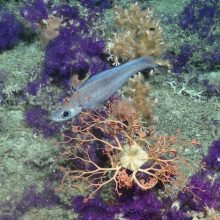MSC Certification hearing to decide future of deep sea orange roughy caught through damaging deep sea bottom trawling
On Monday 24th and Tuesday 25th October, at the offices of the Marine Stewardship Council (MSC) in London, the future of vulnerable corals in the South Pacific ocean and the deep dwelling, slow growing orange roughy will be decided.
With a lifespan that outstrips humans, the orange roughy can live to 150 years of age, does not reproduce until its 30s and grows slowly in the deep ocean. It is caught by dragging heavy nets across the ocean floor and undersea mountains, destroying vulnerable corals and other deep-sea habitat and species. Orange roughy is a species considered highly vulnerable to exploitation and disruption and environmental and conservation groups are opposing moves by the fishing industry to have it certified as a sustainable species for consumption. The Deep Sea Conservation Coalition (DSCC), which represents over 70 non-governmental organisations, together with Bloom, a French association, Greenpeace New Zealand and ECO, a New Zealand environmental group, is challenging proposed certification of the orange roughy fishery in New Zealand.
In a process which the DSCC has heavily criticised, the group charged with assessing the fishery has determined that the fisheries are sustainable and the DSCC Group and WWF have formally objected. Lawyer for the DSCC Duncan Currie who will be attending the hearing said, “The MSC label is a powerful mark which enjoys great trust and therefore bears great responsibility. To apply it to a destructive fishing practice which destroys deep sea corals and to a fishery which has for decades followed a serial depletion strategy would be an unforgiveable breach of both.”
In 2004 the United Nations passed a resolution which recognised the fragility of deep sea ecosystems and the importance of protecting them from destructive fishing practices such as bottom-fishing – the method proposed to be certified.
Three fisheries in New Zealand have been put forward for certification by fishing companies in a process which began in June 2014. The hearing take place on Monday and Tuesday, with the DSCC and other groups arguing that not only does the fishery fail to meet sustainable criteria.
The hearing is closed to the public.

